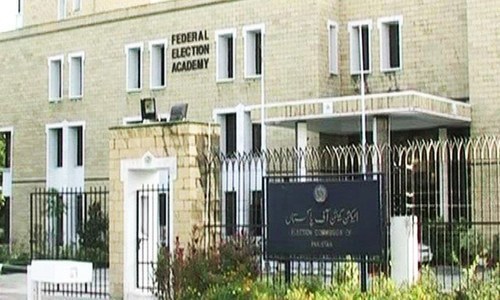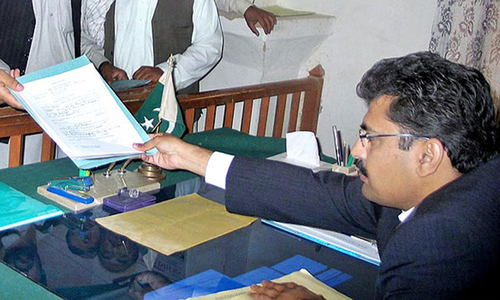ISLAMABAD: In a rare exercise of its power to “read in” the law, the Supreme Court has done away with constitutional bar on the appointment of retired judges as members of the Election Commission of Pakistan (ECP) before completion of two years after their retirement.
The court in a detailed order on a petition challenging the Sindh High Court’s judgement of June 12, 2020 validating appointment of three ECP members made in contravention of the constitutional bar held that since introduction of 22nd Amendment, the words “or member of the Election Commission” were to be read in into clause (2) of Article 207 of the Constitution after the term “Chief Election Commissioner”.
Article 207 (2) in its present form reads: “A person who has held office as a Judge of the Supreme Court or of a High Court shall not hold any office of profit in the service of Pakistan, not being a judicial or quasi-judicial office or the office of Chief Election Commissioner or of Chairman or member of a law commission or of Chairman or member of the Council of Islamic Ideology, before the expiration of two years after he has ceased to hold that office.”
The three-member bench which dismissed the appeal filed by retd Justice Wajihuddin Ahmed of Aam Log Ittehad compromised Justice Sajjad Baqir, Justice Sajjad Ali Shah and Justice Munib Akhtar. Justice Baqir wrote a note of dissent.
Terming the exclusion of ECP members from the exemptions provided in the article as an unintended omission, the apex court in its majority decision said: “Having carefully considered the matter, we are of the view that the present case is an example of the clearest of cases where the intent behind the constitutional amendments is so obvious, and so patently requires appropriate action so as not to defeat the manifest objective thereof, that the constitutional rule of ‘reading in’ can and ought to be invoked in the narrow and limited sense…”.
The bench pointed out that under the constitution there was room for appointment of both sitting and retired judge of the Supreme Court as chief election commissioner, but only serving judges of the high courts were to be appointed as members of the ECP.
“The reason for the ‘failure’ to mention members of the commission in Article 207(2) becomes clear at once. They were not mentioned because there was no need to do so, the court noted. “Article 207(2) applied only to retired Judges. That situation could not, and did not, arise in respect of the members of the Commission on commencing day.”
Referring to 22nd Amendment, the bench said it was now only retired officials (or technocrats) who can be appointed CEC or members of the commission.
According to the judgement, an upper age limit requirement has also been imposed: 68 years for the CEC and 65 for the members. Insofar as the CEC is concerned, there is no change in the context of Article 207(2).
However, in relation to ECP members being retired judges, if that provision were to apply a rather startling result would obtain. By virtue of the provision, no retired judge would be eligible for appointment for a period of two years, i.e., until he reaches the age of 64. But, by virtue of the upper age limit, a retired judge over 65 years would be ineligible.
“Therefore, if the learned petitioner is correct, then there would only be a very narrow band within which retired judges would be eligible: the one-year period between the ages of 64 and 65. On the other hand, retired senior civil servants would be eligible from a five-year band, the ages of 60 (when civil servants retire) till 65. And for technocrats there would be only the upper age limit of 65.
The practical result could well be that on most occasions that a vacancy arises for appointment of an ECP member, retired judges would simply be ineligible since it could well be that there are no judges within the one-year band at that time.
“This could hardly have been the intent behind the constitutional amendment. On the other hand, if Article 207(2) were inapplicable, the pool of eligible Judges would be considerably greater, being those aged between 62 and 65. This would almost certainly ensure that for any vacancy at any given time a suitable pool of retired judges would be available for consideration for appointment. That would accord with the constitutional intent.”
The court also held that the ECP was an administrative and not a judicial or quasi-judicial forum.
Referring to the powers of the ECP in certain matters including disposal of appeals, as vested in a court under the Code of Civil Procedure (CPC), the verdict said the conferment of this sort of powers was a common legislative device that had been adopted in many statutes in respect of diverse offices, bodies, authorities and forums.
“To take but one example, s. 176 of the Income Tax Ordinance, 2001 (“2001 Ordinance”) empowers the Commissioner of Inland Revenue to issue notices to persons to attend to tax (and/or other) authorities, and provide information and produce record etc. Subsection (4) of this section corresponds to s. 126. It lists very much the same sort of matters in respect of which the Commissioner can exercise the powers of a court under the CPC. No one has ever suggested that the Commissioner, by virtue of section 176(4), is to be regarded as being an office or post of a quasi- judicial nature.
Remaining with fiscal laws for the moment, we may also note that such laws routinely provide that for purposes of recovery of tax, the relevant authorities shall have the same powers as does a court under the CPC for the purposes of the recovery of any amount due under a decree, like Section 138 of the 2001 Ordinance, Section 202 of the Customs Act, 1969 and Section 48 of the Sales Tax Act, 1990.
“Again, no one has ever suggested that by reason of such a provision the tax authorities are to be regarded as quasi-judicial. Section 126 is just another example of a well-known, and widely used legislative device and nothing more should be read into it”, the judgment reads.
Three out of the four members of the ECP had been appointed in 2016 in contravention of the constitutional provision that bars re-employment of judges of the superior judiciary within two years of their retirement.
Published in Dawn, December 19th, 2021














































